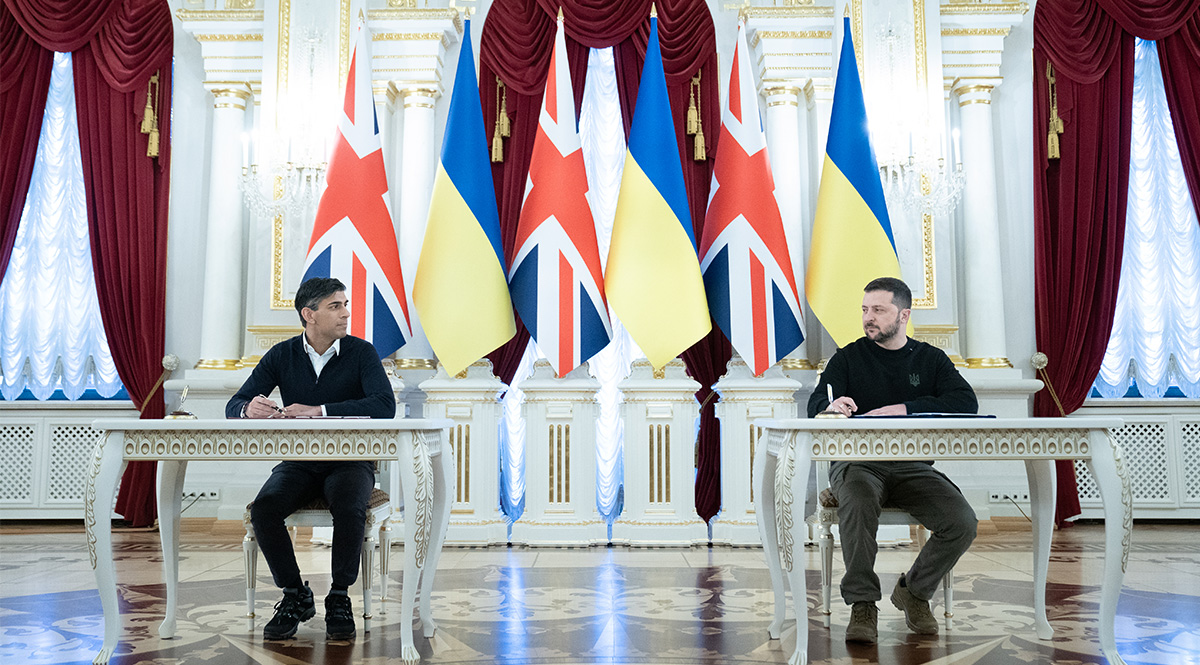UK Signs Security Agreement with Ukraine
During his visit to Kyiv on 12 January, British Prime Minister Rishi Sunak signed a bilateral agreement on security cooperation between the United Kingdom and Ukraine with Ukrainian President Volodymyr Zelensky. The UK is the first of the G7 countries to enter into such an agreement with Ukraine, pledging long-term support in the fight against Russia. While accession to NATO is what Ukraine is aiming for, agreements with G7 countries may in future become a necessary alternative for Ukraine to ensure its security versus membership of the Alliance.
 Stefan Rousseau / PA Images / Forum
Stefan Rousseau / PA Images / Forum
Why did the UK sign a security agreement with Ukraine?
On the margin of the NATO summit in Vilnius in July 2023, the G7 countries adopted a declaration pledging long-term military and financial support to Ukraine in its defence against the Russian invasion and in post-war reconstruction. These commitments were to be formalised in a package of bilateral security cooperation agreements between the G7 countries and Ukraine. The United States was the first among them to start negotiations with Ukraine at the beginning of August 2023, with the United Kingdom starting similar talks a few days later, followed by the other countries of the group. So far, more than 20 countries have joined the Vilnius Declaration, committing themselves—like the G7 countries—to formalising long-term support for Ukraine.
What does the agreement entail?
Concluded for a period of 10 years, the UK-Ukraine agreement provides for extensive military and financial support to Ukraine for the full restoration and future protection of its territorial integrity, including the currently Russian-occupied Crimea. The agreement formalises existing UK assistance in the form of weapons supplies, advice, and training to the Ukrainian army, with a particular focus on naval support. It also provides for the deepening of intelligence cooperation, defence industry cooperation, support for the protection of Ukraine’s critical infrastructure, as well as assistance in post-war reconstruction and reforms of the country. The UK has pledged to come to Ukraine’s rescue immediately in the event of a repeat Russian attack in the future, providing supplies of modern military equipment, financial support, and imposing sanctions on Russia.
What is the significance of the agreement?
As the first among a package of agreements with the G7 countries, the UK-Ukraine agreement sets the standard for other accords, including those negotiated by Ukraine with non-G7 countries in the future. Its signing and accompanying announcements of increased UK military support for Ukraine will have a positive impact on the consolidation of the international coalition of countries supporting Ukraine, especially in the context of the pending adoption of a new U.S. aid package for it. They will also create political pressure on the other G7 countries to advance their own negotiations with Ukraine on corresponding agreements. The package of agreements with the G7 countries will probably pave the way for Ukraine to deepen its military-industrial cooperation with other partners, allowing them to engage with Ukraine under the umbrella of the U.S. and major European countries.
Has the UK given security guarantees to Ukraine?
The agreement with the UK does not contain a mutual defence clause along the lines of Article 5 of the North Atlantic Treaty, nor will the agreements negotiated by Ukraine with the other G7 countries contain one. All of these agreements assume comprehensive military support for Ukraine in the form of the supply of modern weapons but do not oblige their signatories to directly defend Ukraine against Russia, although for internal purposes the Ukrainian authorities have presented these agreements as Western security guarantees. Significantly, the UK-Ukraine agreement is reciprocal, stating that Ukraine will also provide military support to the UK in the event of an attack on it. An analogous clause is likely to be included in the other agreements negotiated with the G7 countries.
Are agreements with G7 countries an alternative to Ukraine’s NATO membership?
G7 security cooperation agreements with Ukraine are intended to provide long-term military and financial support to the country in the transition period until it joins NATO. The agreements envisage helping Ukraine achieve readiness for Alliance membership through comprehensive reform of the armed forces and increasing their interoperability with the forces of NATO countries, and will be subject to revision or will expire after Ukraine’s eventual accession to the Alliance. However, there is currently no consensus among the NATO member states regarding Ukraine’s future membership. For this reason, the bilateral agreements of the G7 countries (and other interested partners) with Ukraine effectively have a substitutive character. Nevertheless, in the future, they could lay the foundations for a system of multilateral security guarantees for Ukraine should it ultimately fail to secure the consent of all NATO members for its accession to the Alliance.



.jpg)

.jpg)